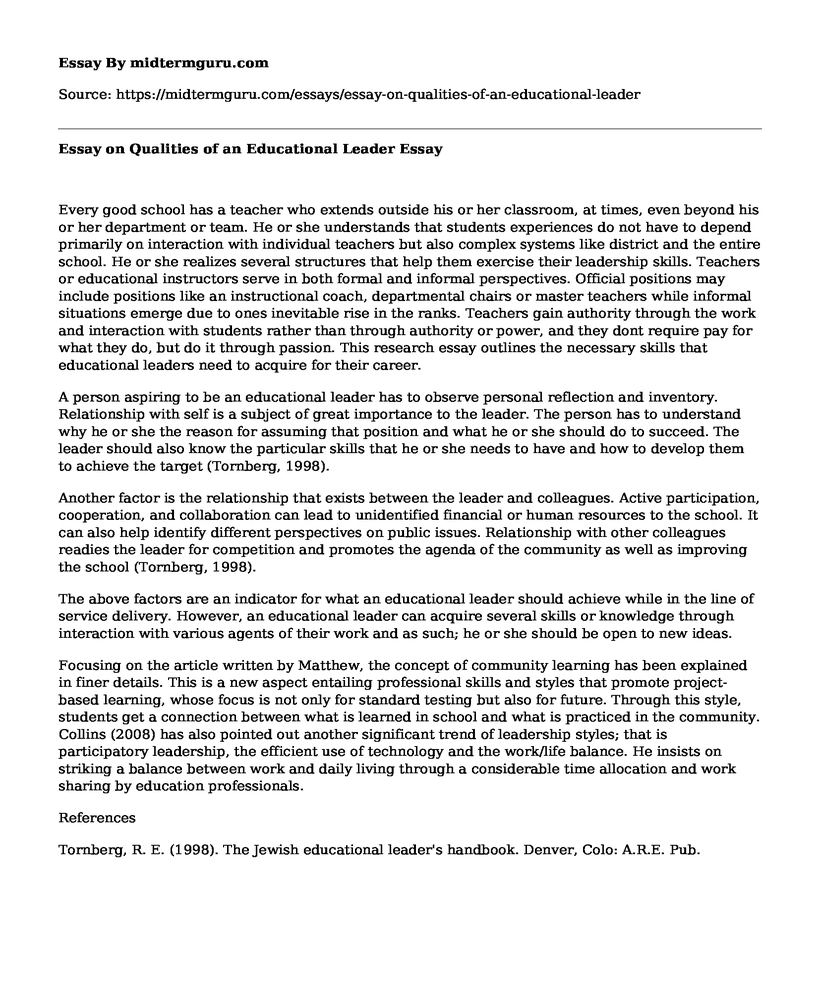Every good school has a teacher who extends outside his or her classroom, at times, even beyond his or her department or team. He or she understands that students experiences do not have to depend primarily on interaction with individual teachers but also complex systems like district and the entire school. He or she realizes several structures that help them exercise their leadership skills. Teachers or educational instructors serve in both formal and informal perspectives. Official positions may include positions like an instructional coach, departmental chairs or master teachers while informal situations emerge due to ones inevitable rise in the ranks. Teachers gain authority through the work and interaction with students rather than through authority or power, and they dont require pay for what they do, but do it through passion. This research essay outlines the necessary skills that educational leaders need to acquire for their career.
A person aspiring to be an educational leader has to observe personal reflection and inventory. Relationship with self is a subject of great importance to the leader. The person has to understand why he or she the reason for assuming that position and what he or she should do to succeed. The leader should also know the particular skills that he or she needs to have and how to develop them to achieve the target (Tornberg, 1998).
Another factor is the relationship that exists between the leader and colleagues. Active participation, cooperation, and collaboration can lead to unidentified financial or human resources to the school. It can also help identify different perspectives on public issues. Relationship with other colleagues readies the leader for competition and promotes the agenda of the community as well as improving the school (Tornberg, 1998).
The above factors are an indicator for what an educational leader should achieve while in the line of service delivery. However, an educational leader can acquire several skills or knowledge through interaction with various agents of their work and as such; he or she should be open to new ideas.
Focusing on the article written by Matthew, the concept of community learning has been explained in finer details. This is a new aspect entailing professional skills and styles that promote project-based learning, whose focus is not only for standard testing but also for future. Through this style, students get a connection between what is learned in school and what is practiced in the community. Collins (2008) has also pointed out another significant trend of leadership styles; that is participatory leadership, the efficient use of technology and the work/life balance. He insists on striking a balance between work and daily living through a considerable time allocation and work sharing by education professionals.
References
Tornberg, R. E. (1998). The Jewish educational leader's handbook. Denver, Colo: A.R.E. Pub.
Cite this page
Essay on Qualities of an Educational Leader. (2021, Jul 02). Retrieved from https://midtermguru.com/essays/essay-on-qualities-of-an-educational-leader
If you are the original author of this essay and no longer wish to have it published on the midtermguru.com website, please click below to request its removal:
- My Greatest Crucible
- Martha Stewart Living Omni Media - Essay Example
- Background and Rise of the Eastman Kodak Company - Paper Example
- Paper Example on Gender Differences in Statistical Anxiety Among South Australian Undergraduate Students
- Why is College So Expensive? - Essay Sample
- Leadership and Conflict Resolution: Essential for Group Development - Research Paper
- Grandchildren's Play Reveals Different Levels of Psychomotor Development - Essay Sample







